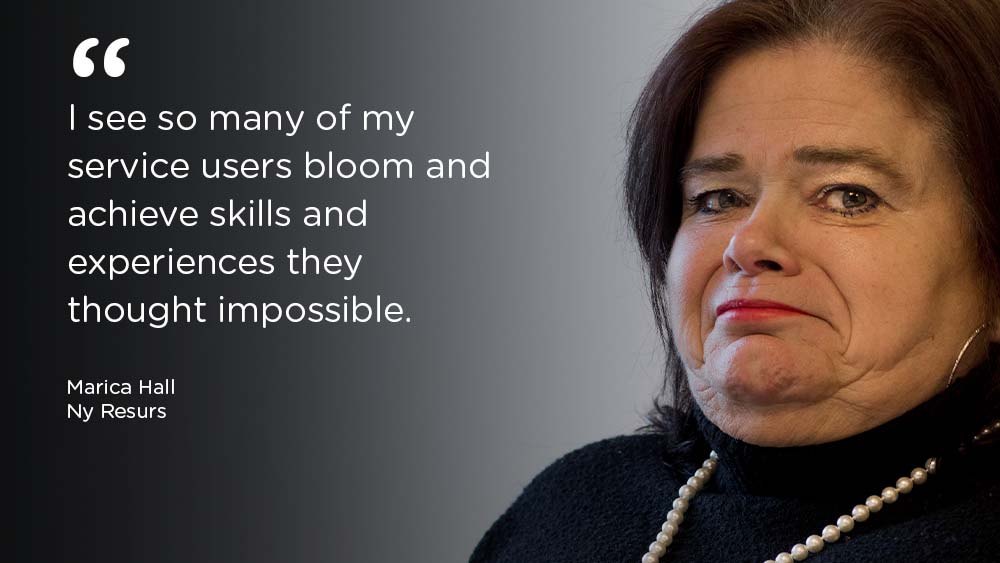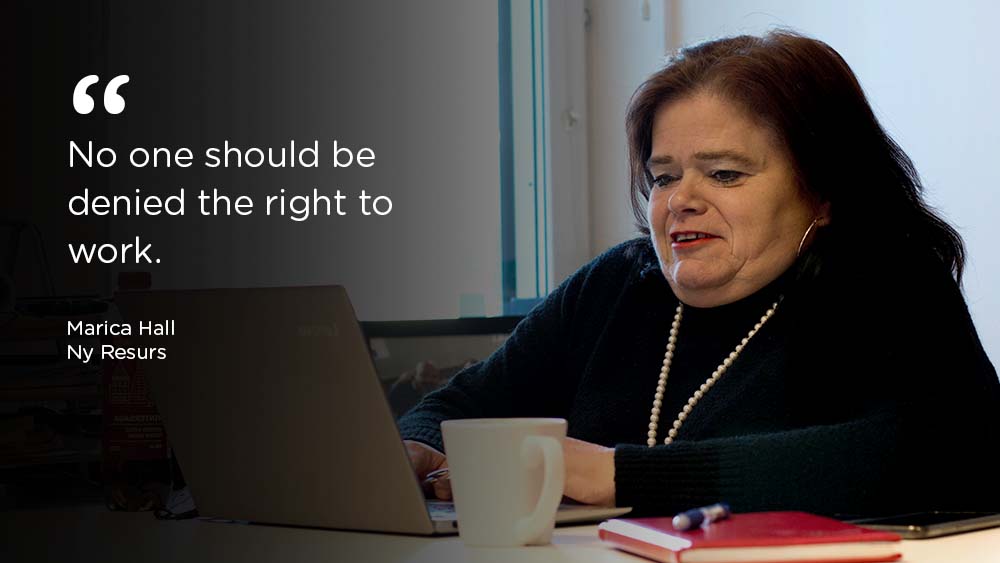An advocate for boosting disabled people’s self-esteem and confidence, Marica Hall started the Ny Resurs initiative, providing staff at sports events. More recently, Marica founded the Team Resurs organization, providing job placements for adults with a disability, bolstering skills, confidence and experience. Marica has a neurogenic condition herself, and shares her experience and knowledge to lift everyone’s understanding of how capable people are.

Why I started Ny Resurs - New Resources
Volleyball runs in the family – my daughter used to play and my brother has been a pro volleyball player; we would all be involved at matches, organizing and coordinating.
Working with me provides an insight into the challenges that someone with a disability might face
I felt that there were opportunities for adults with a disability to perform many of these roles, and so Ny Resurs ("New Resources") was born. That was 10 years ago, and we’ve been tremendously busy ever since.
Running this organization can be a lot of work. Thankfully I am supported by excellent colleagues – and here we have an example of knowledge transfer. They may not have been used to working with someone with a disability. But working with me provides an insight into the challenges that someone might face – of which they would have no idea about, and they in turn become champions of expanding the awareness of the many different lives being led by our service users.
What do they receive from me, you might ask? Well, being organized for sure – I have to plan well ahead and my colleagues understand the value of that. But in all honesty, what we all bring to the table in terms of skills and personalities is a great mix and we achieve a lot.
The value of knowledge transfer
My role is to educate business, healthcare organizations and patient groups about what disability means in terms of ability, getting into work, the potential that is available, and providing the belief and motivation to achieve it. It is often an eye opener for organizations who, with the best of intentions, simply have never thought to entertain new ideas about who and what work is and can be.
When I go out and meet people during my lectures, there are no silly questions, as long as dignity and respect are observed and maintained. The more time-consuming part of my job, during this pandemic, is to raise money by applying for funds and contribution. Services have been cut as healthcare professionals and budgets were deployed to the front lines, and other patient services suffered as a result.
The dignity of work
Being able to work, make a contribution, pay tax and learn new skills; the confidence that comes with all of this – no one should be denied the right to work.
I see so many of my service users bloom and achieve skills and experiences they thought impossible.
But not being able to participate fully in society can lead to isolation, a drop in confidence, a decline in social skills, all impacting health. By providing the belief and the opportunity to experience a working life and receive training, I see so many of my service users bloom and achieve skills and experiences they thought impossible.

Working in a shop behind a counter, acting as a steward at a sporting event – we are removing the barriers as to what has been thought possible. I have never felt anything was impossible, so I’ll continue sharing that message and living that example of empowerment and make a real difference to everyone who wants to use these services.
I’ve always been determined, my parents never treated me differently than my siblings.
I was born with complications surrounding my urology function, as well as scoliosis of the spine. I’ve always been independent, and early on, as a child, I was supported by a devoted doctor who saw me for what I was; a smart, fun loving and very independent child. This doctor gave me hope and pushed me onwards, totally contrary to a later experience when my scoliosis was operated on and the surgeon later told my parents, within earshot: “Well, the operation went well, but don’t count on her ever becoming a parent”.
It left me sad for years, as I loved children – thinking I would never become a mother, never have sex, never meet a man.
So imagine how proud and happy I was to encounter that surgeon several years later with my newborn baby in my arms and in answer to his question: “Whose child is that?” I could simply answer: “Mine.”
But it made me realize the importance of encouragement and being open to possibility rather than seeing limitations. I’ve kept this attitude of never giving up and wanting to help others, and there’s nothing like seeing a person with low self esteem grow with the confidence that he or she can achieve something on their own.
In my work, I see the benefit of this attitude first hand. One service user had such low self-esteem, he wasn't able to make eye contact. Now he shines and takes his own initiatives. Another service user felt that she couldn't participate in a work environment place she couldn't count - just by becoming confident in using the calculator app on her phone, she can now work the till at a café . By empowering these service users, they demonstrate to themselves that they can do it, and their confidence goes through the roof!
Experiencing freedom
Because of my condition, as I child, I couldn't empty my bladder like most people. My bladder was emptied by pushing down on my abdomen – can you imagine! So imagine the feeling of freedom I felt when I didn’t have to have someone accompanying me into the toilet anymore!
You could say I was lucky, coming to LoFric so early in the 1980s. Unlike other brands, the Urotonic Surface Technology – the smooth surface of the catheter, ensured that I have mostly avoided Urinary Tract Infections during a lifetime of using intermittent catheters, says Marica.
There are a lot of catheters out there, many different brands, but they are not all the same.
Different surfaces, different ways of handling and opening the catheter package. The size, and length. It’s very important to select a catheter that is safe, and is is comfortable. As a child, I needed to be supervised every time when visiting the toilet. When I received LoFric, I needed, maybe two tries with supervision, and after that – it was no problem for me to perform Intermittent Catheterization (IC) independently.
I also discovered after my first pregnancy that listening more closely to my bodily needs have improved my urinary health routine. I drink a lot of water which makes me much healthier
And IC actually makes my bladder healthier – for me; regular, complete emptying keeps the bladder in shape helps avoid regular urinary tract infections, Marica continues. I don’t fear visiting the toilet – I’m always prepared.





